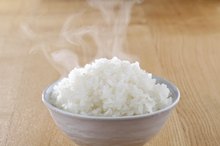What does fact checked mean?
At Healthfully, we strive to deliver objective content that is accurate and up-to-date. Our team periodically reviews articles in order to ensure content quality. The sources cited below consist of evidence from peer-reviewed journals, prominent medical organizations, academic associations, and government data.
The information contained on this site is for informational purposes only, and should not be used as a substitute for the advice of a professional health care provider. Please check with the appropriate physician regarding health questions and concerns. Although we strive to deliver accurate and up-to-date information, no guarantee to that effect is made.
Rice Congee for Diarrhea
Effective treatment of diarrhea does not require medication. Diarrhea is a common condition that causes three or more loose stools a day and may include stomach pain. Diarrhea is the second highest cause of infant death, according to the World Health Organization. However, it rarely occurs in the United States. Some foods help manage diarrhea. Rice congee is recommended by nutritionist and author Phyllis Balch as an effective source to treat diarrhea in her book "Prescription for Nutritional Healing. 3"
If you are experiencing serious medical symptoms, seek emergency treatment immediately.
Rice Congee Effects
Rice congee is bland and low in fiber, so it does not disrupt the digestive system. The water in the rice congee helps replenish your body's electrolytes, which are lost in loose stools.
Rice Congee Recipe
Rice & Constipation
Learn More
The Lifelong AIDS Alliance, a nonprofit organization that serves people living with HIV/AIDS, recommends using 1 cup of arborio rice, eight to 10 cups water and 1 tsp. of salt. Simmer the ingredients with the rice for about an hour until it becomes a thick porridge. Add ingredients such as maple syrup, bananas, cinnamon or fruit spread to sweeten the congee. If your diarrhea is persistent, eat the rice congee three times a day for a few days at most.
- The Lifelong AIDS Alliance, a nonprofit organization that serves people living with HIV/AIDS, recommends using 1 cup of arborio rice, eight to 10 cups water and 1 tsp.
- If your diarrhea is persistent, eat the rice congee three times a day for a few days at most.
Diarrhea Causes & Treatment
Common causes of diarrhea include an allergy reaction, food poisoning, viral infection and adverse reactions to medication. Frequent stools are the body's attempt to get rid of the bacteria or virus causing the diarrhea. Diarrhea should not last more than a couple of days, so consult a doctor if diarrhea persists after three days. Drink eight to 10 glasses of water, soda or sport drinks daily. Drink 1 to 3 cups of liquid after loose stools. Eat four to six small low-fiber meals during the day, instead of three large meals. Incorporate bananas, toast and applesauce to your meals. If vomiting occurs, stick to clear soups, gelatin and toast.
- Common causes of diarrhea include an allergy reaction, food poisoning, viral infection and adverse reactions to medication.
- Eat four to six small low-fiber meals during the day, instead of three large meals.
Considerations
What Are the Treatments for Loose Stools?
Learn More
National Institutes of Health online medical encyclopedia Medline Plus recommends avoiding anti-diarrheal medication unless instructed by a medical professional 1. Certain infections or the form of diarrhea can worsen due to medication. Chronic diarrhea is when you have loose stools for more than four weeks. Consult a doctor if this occurs, and eat food such as whole-wheat grain and bran to thicken stool. Medication containing psyllium will help solidify stools.
- National Institutes of Health online medical encyclopedia Medline Plus recommends avoiding anti-diarrheal medication unless instructed by a medical professional 1.
- Certain infections or the form of diarrhea can worsen due to medication.
Related Articles
References
- Medline Plus: Diarrhea
- Medline Plus: Bananas and Upset Stomach
- "Prescription for Nutritional Healing"; Dr. Phyllis Balch; 2010
- U.S. Department of Health and Human Services. Symptoms & Causes of Diarrhea. Updated November 2016.
- Centers for Disease Control and Prevention. Managing Acute Gastroenteritis Among Children. Published November 10, 2003.
- U.S. Department of Health and Human Services. Treatment for Diarrhea.Updated November 2016.
- Mayo Clinic. Diarrhea. Last reviewed June 16, 2020.
- Quigley EMM. Prebiotics and probiotics in digestive health. Clin Gastroenterol Hepatol. 2019;17(2):333-344. doi:10.1016/j.cgh.2018.09.02
- Su G, Ko C, Bercik, P, ET al. AGA clinical practice guidelines on the role of probiotics in the management of gastrointestinal disorders. Gastroenterology. June 9 2020. doi:https://doi.org/10.1053/j.gastro.2020.05.059
- U.S. National Library of Medicine. Clostridium Difficile Infections. Updated June 3, 2019.
- Churgay CA, Aftab Z. Gastroenteritis in children: Part II. Prevention and management. Am Fam Physician. 2012;85(11):1066-1070.
- McFarland LV, Goh S. Are probiotics and prebiotics effective in the prevention of travelers' diarrhea: A systematic review and meta-analysis.Travel Med Infect Dis. 2019;27:11-19. doi:10.1016/j.tmaid.2018.09.007
- World Bank Group. Oral rehydration solutions (ORS) [PDF]. 2019.
Writer Bio
Jamie Aldridge has been a writer and editor since 2005, contributing to the "The Observer" and "Seniors Today." He has also worked as a nutritionist and research technician for the Food Standard Agency. Aldridge holds a Bachelor of Science in nutrition and a Master of Research in clinical practice.









